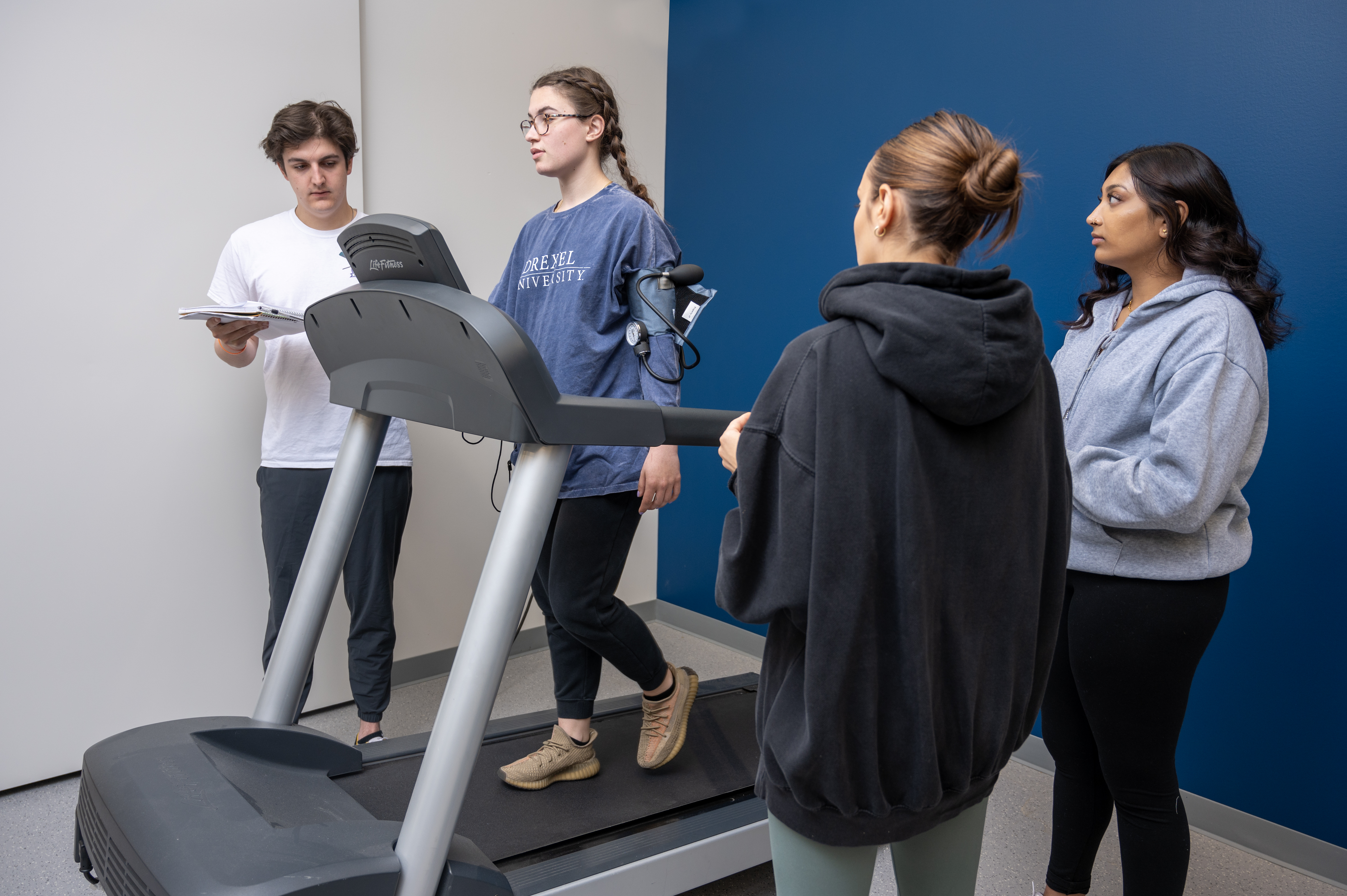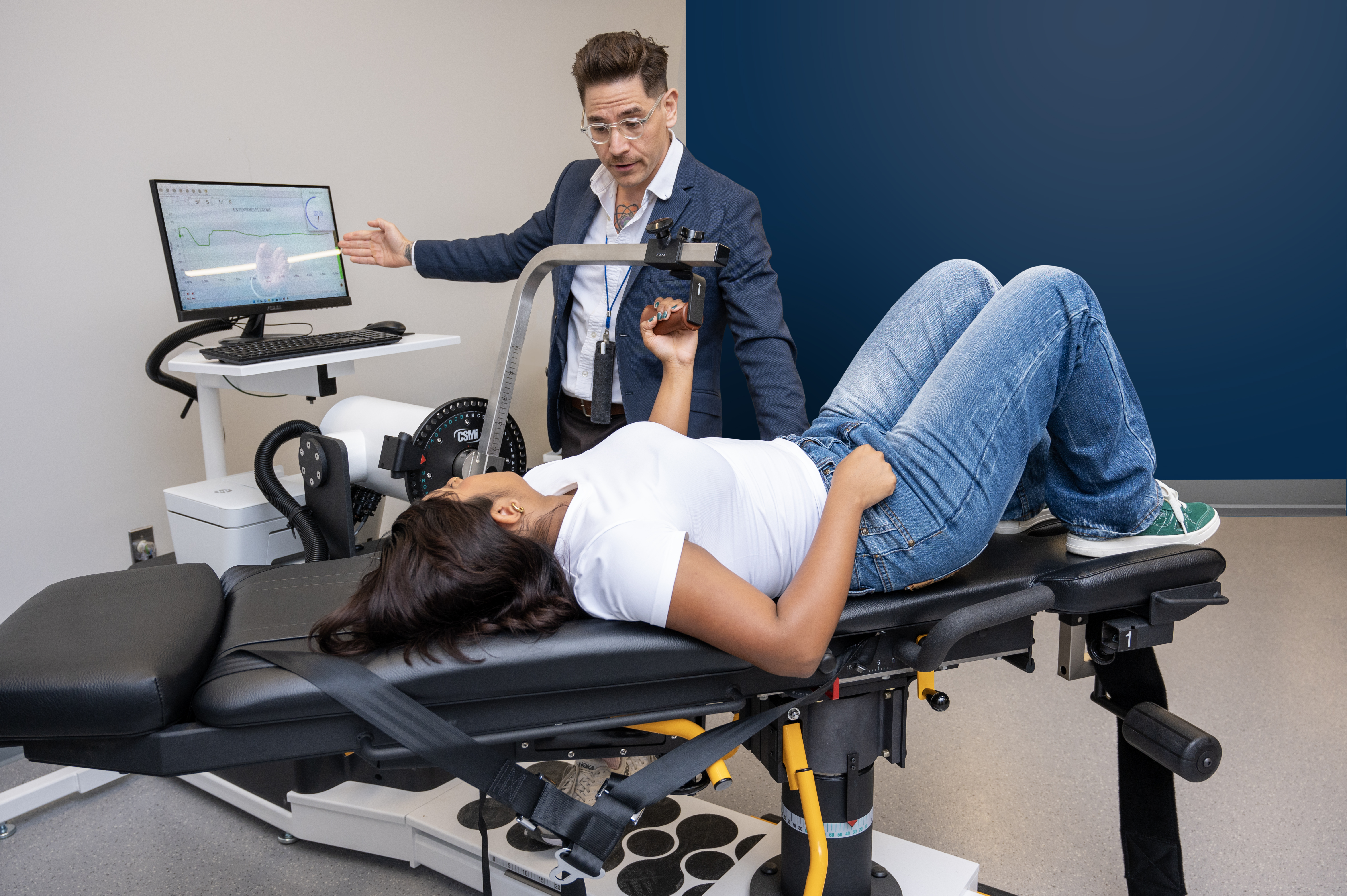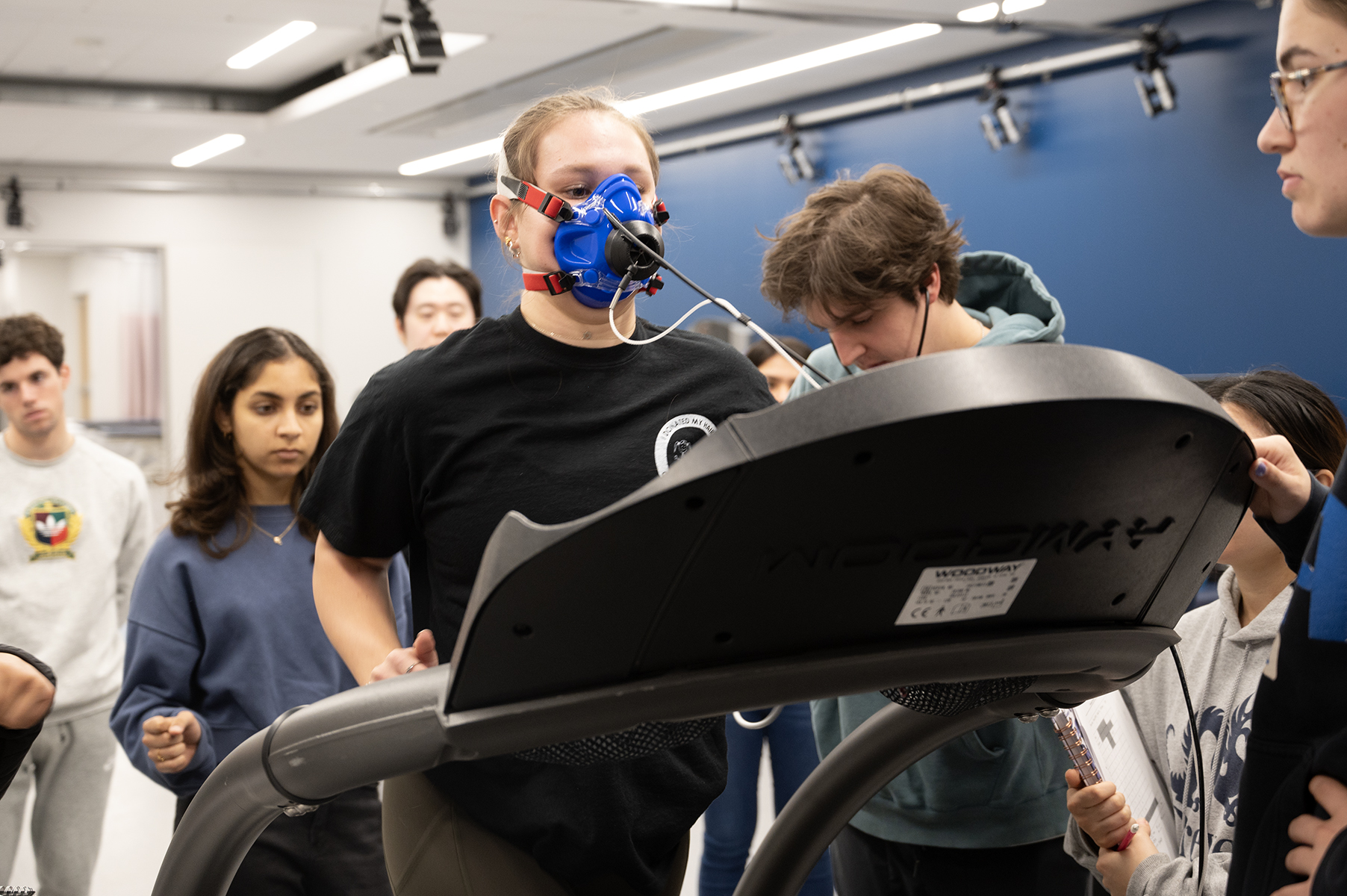Build a Career in Health, Fitness and Human Performance
.ashx?la=en)
Drexel University’s Bachelor of Science (BS) in Exercise Science is a dynamic, interdisciplinary program that blends foundational health and wellness education with advanced training in exercise science and sports medicine. Designed to prepare students for careers in fitness, rehabilitation and clinical health settings—or for graduate study—this program emphasizes the science of human movement and the promotion of lifelong well-being.
What Is Exercise Science?
Exercise science is the study of how physical activity impacts the human body. It combines knowledge from:
- Biomechanics
- Exercise physiology
- Sports nutrition
- Sport and exercise psychology
- Motor control and development
- Athletic training and rehabilitation
- Fitness for special populations
Professionals in this field use evidence-based practices to improve physical performance, prevent injury and promote health across diverse populations.
Why Choose Drexel’s Exercise Science Program?
- Health-Focused Curriculum: Unlike many programs that focus solely on athletic performance, Drexel’s curriculum emphasizes the relationship between exercise and overall health.
- Preparation for Certification: Students are well-prepared to pursue certifications from organizations like the American College of Sports Medicine (ACSM) and other accredited bodies.
- Graduate School Ready: The program satisfies prerequisites for advanced degrees in Exercise Physiology, Clinical Exercise Physiology, Kinesiology, Physical Therapy, Occupational Therapy and Public Health.
- Experiential Learning: Drexel’s renowned co-op program provides hands-on work experience in clinical, research and fitness settings.
- Research Opportunities: Students engage in faculty-led research in areas such as cardiovascular health, rehabilitation science and performance optimization.
Program Highlights
- Full-time, in-person undergraduate degree
- Interdisciplinary coursework in health sciences and sports medicine
- Opportunities for co-op, internships and research
- Located in Philadelphia, a hub for healthcare and fitness innovation
Meet the Faculty
- Michael Bruneau Jr., PhD, FACSM, ACSM EP-C, NASM CPT
- Jodie Haak, PhD
- Jacqueline Philips, PhD, LAT, ATC
- Meghan E. Smith, PhD
- Steven Vitti, PhD, ACSM-EP
Take the Next Step
Turn your passion for health and fitness into a rewarding career. Explore Drexel’s BS in Exercise Science and discover how you can make a difference in the lives of others.
Apply Now
Request Info
Schedule a Visit
Admissions
Admissions Information for Entering Freshmen
To review admission prerequisites, visit the Admission Prerequisites page.
To find admissions deadlines, apply online, check out financial aid information and find the current schedule for open houses, visit the Undergraduate Admissions site.
Admissions Information for Transferring Students
To review transfer instructions, visit the Transfer Instructions page.
Admissions Information for International Students
To review transfer instructions, visit the International Instructions page.
Tuition and Fee Rates:
Please visit the Tuition and Fee Rates page on Drexel Central
COMPLIANCE
The College of Nursing and Health Professions has a compliance process that may be required for every student. Some of these steps may take significant time to complete. Please plan accordingly.
Visit the Compliance pages for more information.
Curriculum
Featured Exercise Science Program Courses
This course is designed to provide students with opportunities to engage in interprofessional practice, education and research with an emphasis on the American College of Sports Medicine’s Exercise is Medicine initiative. Students learn about Exercise is Medicine as a global health initiative in making physical activity assessment and promotion a vital sign in standard clinical care for people everywhere and of all abilities.
This course provides students with opportunities to examine current and developing technologies, and their integrations, in exercise science. Students learn about top health and fitness trends that leverage and integrate virtual, online and wearable technologies. Students also gain experience in the study of strategic engagement with digital modalities, addressing challenges people may face alone and/or in group settings and exploring innovations and emerging trends in digital wearable technologies and applications.
Aging populations continue to grow and are recognized as unique periods in lifespan. Exercise offers opportunities and benefits at each stage of aging for individuals to mitigate the deleterious effects of aging and experience “healthy aging.” Students learn about core theories and processes of human aging, including structural and functional changes, that can influence longevity, the onset of chronic diseases and quality of life. Students also apply the principles of exercise physiology (acute responses, long-term adaptations) and identify the positive effects of physical activity and exercise for human health and wellness.
Physical inactivity rates are alarmingly lower among populations with disabilities and underserved and marginalized populations. There are unique challenges for these populations that warrant attention from exercise scientists and public health professionals. This course is designed to develop student’s knowledge and skills related to the fitness and wellness needs of diverse populations of individuals, including consideration for developmental and other disabilities linked to physical, emotional or cognitive impairments. Students will develop fitness and wellness programming that considers the practical, ethical, legal and human aspects of inclusion.
| YEAR 1 |
| Cells and Biomolecules AND Cells and Biomolecules Lab |
| General Chemistry I |
| Composition and Rhetoric I: Inquiry and Exploratory Research OR English Composition I |
| Foundations of Exercise Science |
| The Drexel Experience |
| Genetics and Evolution AND Genetics and Evolution Lab |
| General Chemistry II |
| Composition and Rhetoric II: Advanced Research and Evidence-Based Writing OR English Composition II |
| Introduction to Civic Engagement |
| Introduction to Analysis I |
| Physiology and Ecology AND Anatomy and Ecology Lab |
| General Chemistry III |
| Composition and Rhetoric III: Themes and Genres OR English Composition III |
| Introduction to Analysis II |
| YEAR 2 |
| Health & Wellness Throughout the Lifespan |
| Anatomy and Physiology I |
| Nutrition, Foods, and Health AND Introduction to Nutrition & Food |
| General Psychology I |
| Career Management and Professional Development |
| Introduction of Exercise Science |
| Anatomy and Physiology II |
| Introduction to Research Methods |
| Anatomy and Physiology III |
| Statistics for Health Sciences |
| Public Health 101 |
| Introductory Physics I |
| Health Assessment Through the Lifespan |
| Introduction to Sociology |
| Business Elective |
| Free Elective |
| YEAR 3 |
| Co-op Experience |
| Co-op Experience |
| Sport, Industry, and Society |
| Concepts & Practices in Inclusive Physical Activity |
| Exercise Physiology I with Lab |
| Prevention and Care of Athletic Injuries |
| ESCI Elective |
| Technological Advancements & Integrations in Exercise Science |
| Exercise Physiology II |
| Exercise for Clinical Populations |
| Free Elective |
| YEAR 4 |
| Applied Anatomy and Kinesiology |
| Exercise Testing and Prescription |
| Current Issues in Health Science |
| ESCI Elective |
| Aging and Exercise |
| Pharmacology & Ergogenic Aids in Exercise Science |
| Strength and Conditioning |
| Wellness & Fitness Program Management |
| Physical Growth and Motor Behavior |
| Exercise is Medicine: A Campus Experience |
| Aging and Exercise |
| ESCI Elective |
Accreditation
MSA: The Exercise Science Program is fully accredited by Middle States Association of Colleges and Secondary Schools. www.middlestates.org
Outcomes

At Drexel University we believe that a well-formulated set of Program Level Outcomes [PLO] that support and are consistent with the institutional mission and goals are the building blocks of an effective assessment program.
Click here to view the College of Nursing and Health Professions Exercise Science Program Level Outcomes.
Career Opportunities
Numerous career opportunities exist in a variety of fields directly related to exercise, fitness, and sport. While some students are new to the exercise science field, others will enter our program with previous fitness industry experience. Our program will provide all students with comprehensive education and practice opportunities to enhance their career goals.
Graduate School Opportunities
Undergraduate Exercise Science students may be interested in graduate study in related areas. Students in our program will be advised and well-prepared for master’s and doctoral programs.
- Master's Applied Exercise Physiology
- Master's Clinical Exercise Physiology
- Master's Exercise Physiology
- Master's Adapted Physical Education
- Master's Adapted Physical Activity
- Master's Athletic Training
- Master's Sport and Exercise Psychology
- Master's Sport Management
- Master's Sport Coaching, Leadership and Administration
- Master’s Kinesiology
- Master’s Occupational Therapy
|
- Master’s Health Education
- Master’s Biomechanics
- Master's Sports Nutrition
- Master's Physician Assistant
- Master's Health and Rehabilitation Science
- Physical Therapy (Doctoral)
- Exercise Physiology (Doctoral)
- Sport and Exercise Psychology (Doctoral)
- Cognitive and Motor Neuroscience (Doctoral)
- Medical School
|
Employment Statistics
Employment of exercise physiologists is projected to grow 13% from 2020 to 2030, faster than the average for all occupations.
Employment of fitness trainers and instructors is projected to grow 39% from 2020 to 2030, much faster than the average for all occupations.
Employment of physical therapists is projected to grow 21% from 2020 to 2030, much faster than the average for all occupations.
–U.S. Bureau of Labor Statistics
Professional Certification
Students may wish to pursue a professional fitness certification during or after undergraduate study as additional preparation for a career. Professional certifications in Exercise Science disciplines are highly encouraged and may be necessary for some career goals (in addition to your degree). There are multiple certifications that may be applicable to your goals and faculty will advise students on which may be most useful. These certifications are issued by:
Professional Organizations
Students are encouraged to seek membership and actively engage with professional organizations whose mission and scope align with exercise science and sports medicine careers of interest to our students. Professional organizations in the field of exercise science and sports medicine provide students with valuable services and resources, such as newsletters and journals, discounted membership fees, reduced webinars and conference registration fees and bulletins providing members with career development and employment opportunities.
Exercise Science Co-Ops

At Drexel University, our cooperative (Co-Op) education experiences make us unique. Co-Op provides students with learning opportunities to integrate academic learning with practical real world experiences. Students enrolled in Co-Op apply theoretical knowledge gained in their coursework in professional settings, enabling them to not only develop technical expertise but a deeper understanding of the industry nuances, opportunities and needs. Our network of Co-Op partners provide students with opportunities to work in cutting-edge industries, collaborate with leading professionals and gain exposure to various specialties within the field of exercise science and sports medicine. An exercise science Co-Op at Drexel produces graduates that are not only academically qualified but industry ready for the practical and professional skillsets needed to succeed in careers as they exist today and how careers within the profession will evolve in the future.
Students at Drexel can pursue several experiential Co-Ops in venues that include but are not limited to commercial fitness centers and gyms, rehabilitation centers, sports performance facilities, clinical settings, corporate wellness programs, research institutions, community health organizations, professional sports teams and wellness consulting firms, among others. For a list of currently available Co-Op programs available for students in the Exercise Science major, visit the Steinbright Career Development Center for more information.
Facilities

The Exercise Science program classes and affiliated program research lab space will be housed in a brand-new Health Sciences building that will open Fall 2022. Students may also engage in learning and research opportunities in laboratories and physical activity space across campus.
In addition to new state of the art classroom space in the new Health Sciences building on University City campus, there are several well-equipped research and teaching laboratories:
- The Exercise Science Lab
- The Human Performance & Aging Lab
- The Applied Physiology Laboratory
- The Cadaver Anatomy Laboratory
- Food, Nutrition and Human Performance Core Lab
- Multiple Instrumented Motion Capture Labs
- Physical Therapy Gym
- Metabolic Research Lab
- Kinect-based Gaming Lab
Research equipment:
- Lunar iDXA Scanner for Bone Health
- Vicon Motion Capture System: Gait Analysis & Rehabilitation
- Humac Norm Isokinetic Dynamometer
- Supersonic Image Aixplorer® Utrasound Imaging
- Immersive education and Virtual Reality (VR)
- Functional near-infrared spectroscopy (fNIRS)
- ADI physiology equipment
- Jamar Handgrip Dynamometers
- AMTI Accupower and Accusway forceplates
- Lange Calipers
- ErgoSelect cycle ergometers
- VMAX VO2 max system
- Oxycon VO2 max system
- ECG interpretation modules
- Polar HR monitors
- Sit and Reach boxes
- InBody assessment of BIA
- Omron handgrip
- Tanita lower body BIA
- Accelerometers